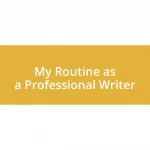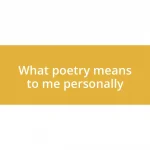Key takeaways:
- Failure in poetry is essential for growth, prompting reflection and deeper connection with one’s audience.
- Clarity, emotional authenticity, and vulnerability are crucial for effective poetic expression.
- Feedback should be viewed as a valuable tool for improvement, revealing insights about the reader’s experience.
- Revising techniques, such as taking breaks and reading aloud, greatly enhance the quality and impact of poetry.
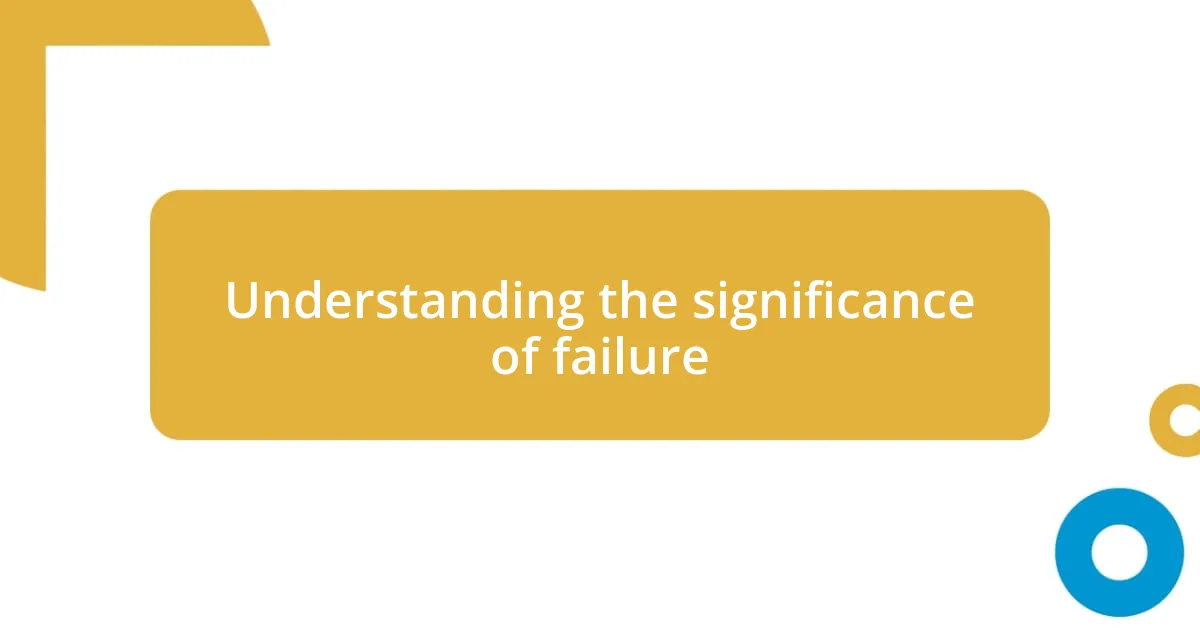
Understanding the significance of failure
Failure in poetry isn’t merely a setback; it’s a vital part of the creative process. I remember drafting a poem that felt heavy with potential, only to realize it fell flat when read aloud. That moment was frustrating, sure, but it prompted me to dig deeper into what I truly wanted to express. Isn’t it fascinating how those disappointments often reveal the heart of our true intentions?
Embracing failure forces us to reflect. I once had a poem that was so abstract, even I struggled to grasp its meaning. After sharing it in a workshop, I felt embarrassed, but the feedback was enlightening. It dawned on me that clarity and connection are essential in poetry. Perhaps that’s the beauty of stumbling: it encourages us to refine our craft and connect more sincerely with our audience.
When we face failure, we confront vulnerability, a powerful muse of its own. In my early writing days, a particularly harsh rejection stung deeply, yet it fueled a passion for growth and exploration in my subsequent work. This blend of pain and resilience not only improves our art but also cultivates empathy — both essential traits for any poet. Have you ever considered how your failures might shape your voice?
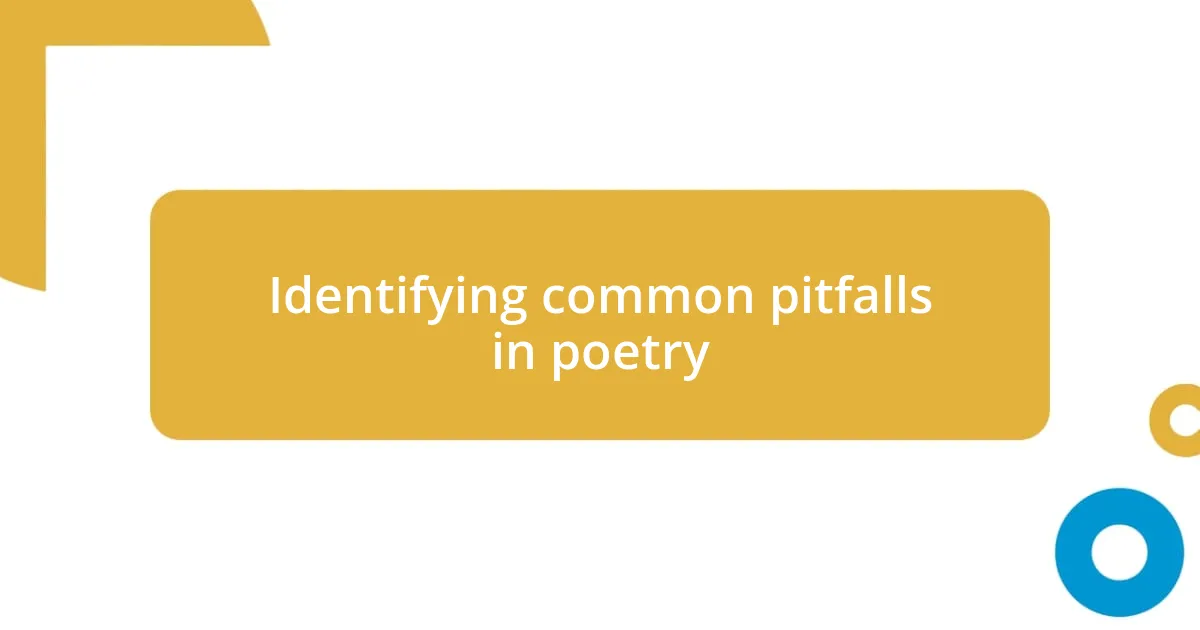
Identifying common pitfalls in poetry
Identifying common pitfalls in poetry requires a reflective eye and an open heart. From my experience, one major pitfall is overcomplicating language. I remember trying to impress readers with complex metaphors, only to lose the underlying message. It’s easy to fall into the trap of being “poetic” rather than genuine, which can alienate rather than connect.
Here are some common pitfalls to watch out for:
- Lack of clarity: If even you can’t articulate the poem’s message, chances are your readers won’t grasp it either.
- Overused clichés: Relying on familiar phrases can make your work feel uninspired and predictable.
- Ignoring structure: While free verse has its charm, neglecting rhythm and form can lead to disjointed ideas.
- Failure to evoke emotion: Poetry thrives on emotional connection. If your work doesn’t stir any feelings, it may miss the mark.
- Neglecting revision: Poems often require multiple drafts. Skipping this step can leave subtleties unexplored.
In my early days, I frequently overlooked these pitfalls, believing raw emotion alone would suffice. There was one poem about love where I poured my heart out but failed to consider how my audience would interpret it. Realizing this reinforced the importance of taking a step back and assessing the clarity and emotional depth of my work. What I learned is that poetry is as much about the reader’s experience as it is about the writer’s intentions.
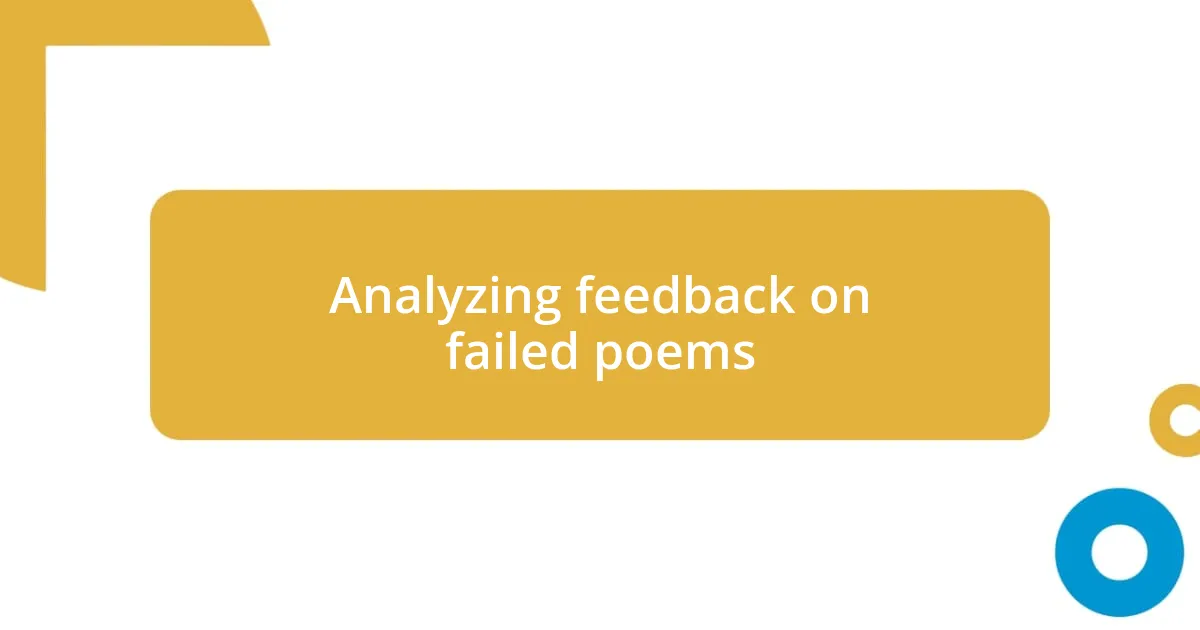
Analyzing feedback on failed poems
Analyzing feedback on failed poems can reshape your poetic journey. I recall sharing a poem that I believed was profound. However, the feedback I received highlighted a disconnect between my intention and execution. My readers struggled with its complexity, and it dawned on me: I had lost sight of my audience. This moment prompted me to appreciate feedback not as criticism, but as a lens to understand how my voice was received. Isn’t it crucial to remember that our poems exist in a shared space?
During one workshop, I presented a poem I considered a masterpiece. I felt the words flowed perfectly, yet the silence in the room was deafening. When I finally asked for feedback, one participant hesitantly mentioned that the imagery was too obscure. I realized then that my artistic vision had overshadowed clarity. This experience taught me the importance of feedback; it’s a tool for connection, helping us tear down walls that can isolate us as poets.
I’ve learned to celebrate feedback, even when it stings. One particularly insightful comment helped me acknowledge my tendency to avoid vulnerability in my work. By confronting this weakness, I transformed my poetry from polished but distant to raw and relatable. Reflecting on feedback has not only enhanced my writing but has also deepened my appreciation for the reader’s perspective—after all, poetry isn’t just our words; it’s a shared experience.
| Feedback Aspect | Personal Experience |
|---|---|
| Clarity | My complex poem confounded readers, showing the need for clear expression. |
| Imagery | An obscured image in a poem led to silence, highlighting the value of accessible imagery. |
| Vulnerability | A reminder of my avoidance of personal themes changed my approach for the better. |
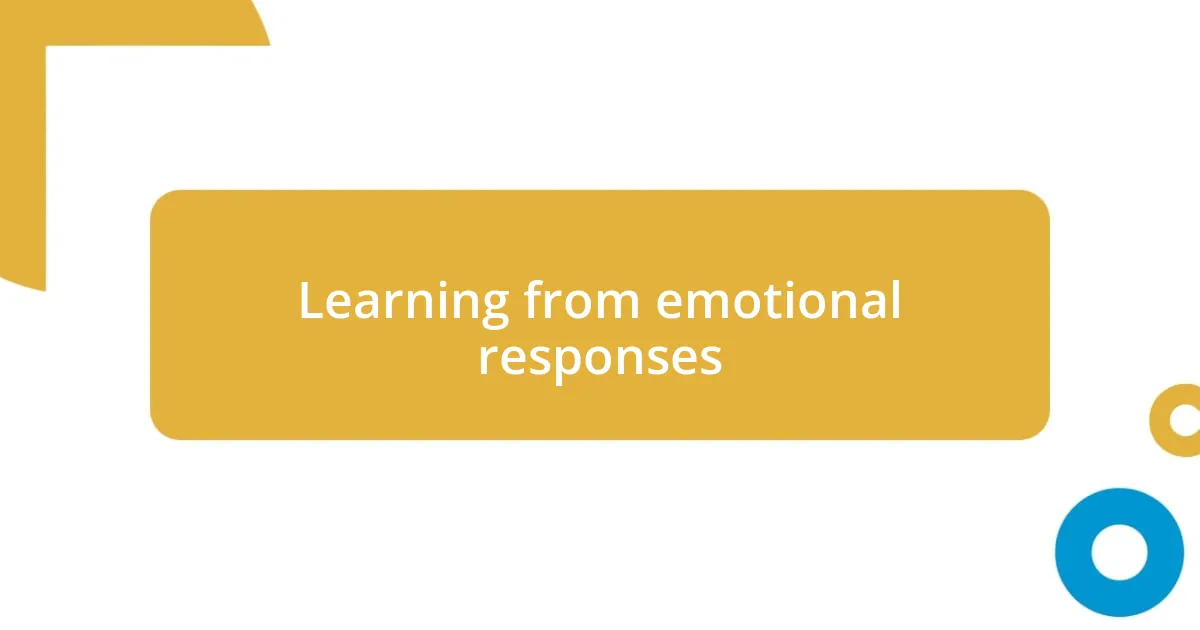
Learning from emotional responses
When I look back on my journey through poetry, I see how my emotional responses profoundly shaped my work. There was a time I wrote a poem reflecting on grief, pouring my heart into each line. I thought I had conveyed my pain effectively, but the piece felt heavy and inaccessible to my readers. It struck me then that, while my emotions were genuine, the way I expressed them needed refinement. How can we share our deepest feelings without creating a barrier through complexity?
In another instance, I crafted a poem bursting with joy after an unexpected success. Excited, I used exuberant metaphors and vivid imagery, yet when I shared it at an open mic night, the response was lukewarm. I realized that I was so caught up in my elation that I overlooked how to make that joy resonate with others. This taught me that emotional authenticity is key, but connecting that emotion to the reader’s experience is equally important. Have you ever felt a disconnect between your feelings and how others perceive them?
Through these experiences, I learned that emotional responses are powerful tools in poetry, but they need to be balanced with clarity and relatability. Each poem is a bridge between the writer and the reader, and finding the right foundation is essential. When I deliberately focused on evoking a specific emotional reaction while also simplifying my language, my writing transformed. Suddenly, I could share my experiences in a way that felt intimate yet understandable. Isn’t it fascinating how our emotional landscapes can guide us toward deeper connections with others through mere words?
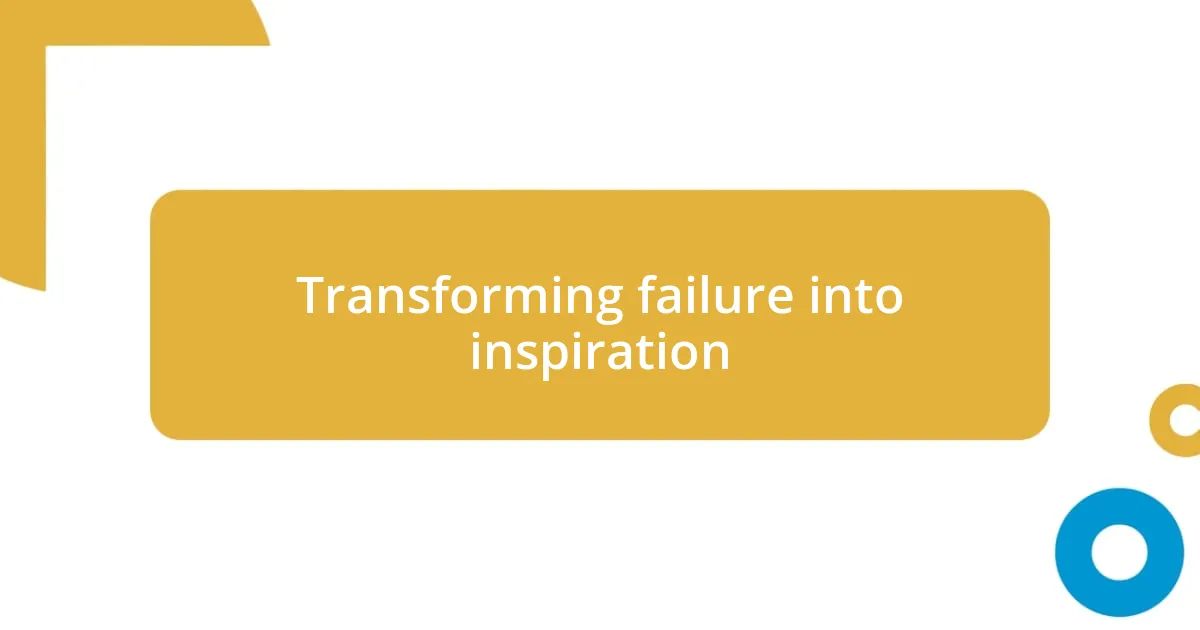
Transforming failure into inspiration
Transforming failure into inspiration is not just about accepting setbacks; it’s about actively mining those experiences for gems of wisdom. I remember a time when I wrote a poem that fell flat in reception. It felt like an emotional punch to the gut. However, instead of wallowing in disappointment, I examined what went wrong. I realized that my desire to impress overshadowed my intention to connect. This shift in perspective became a catalyst for my future writing—every failure was now a stepping stone toward clarity.
It’s remarkable how a disappointing poem can ignite a spark of creativity when viewed through the lens of growth. I once jotted down lines that felt profound in the moment, only to discover they lacked real substance. Reflecting on that experience, I chose to sketch out a lighter, more playful piece instead. What surprised me was the authenticity that emerged from my failure. By allowing humor and lightness to find their way into my work, I not only reclaimed my joy in writing but also connected with others on a deeper level. Isn’t it interesting how vulnerability can morph into strength?
I’ve found that the most profound transformations often happen in the wake of what I once saw as failure. For instance, after a series of rejected submissions, I decided to revisit what truly mattered to me rather than what I thought would be marketable. That decision led me to write a raw, unfiltered piece about a personal struggle. The moment I shared it, the outpouring of resonance was overwhelming. This taught me that inspiration often sprouts from our most painful lessons, reminding us to embrace our stories as they are—complex, imperfect, and uniquely ours. Isn’t that what makes poetry so beautifully human?
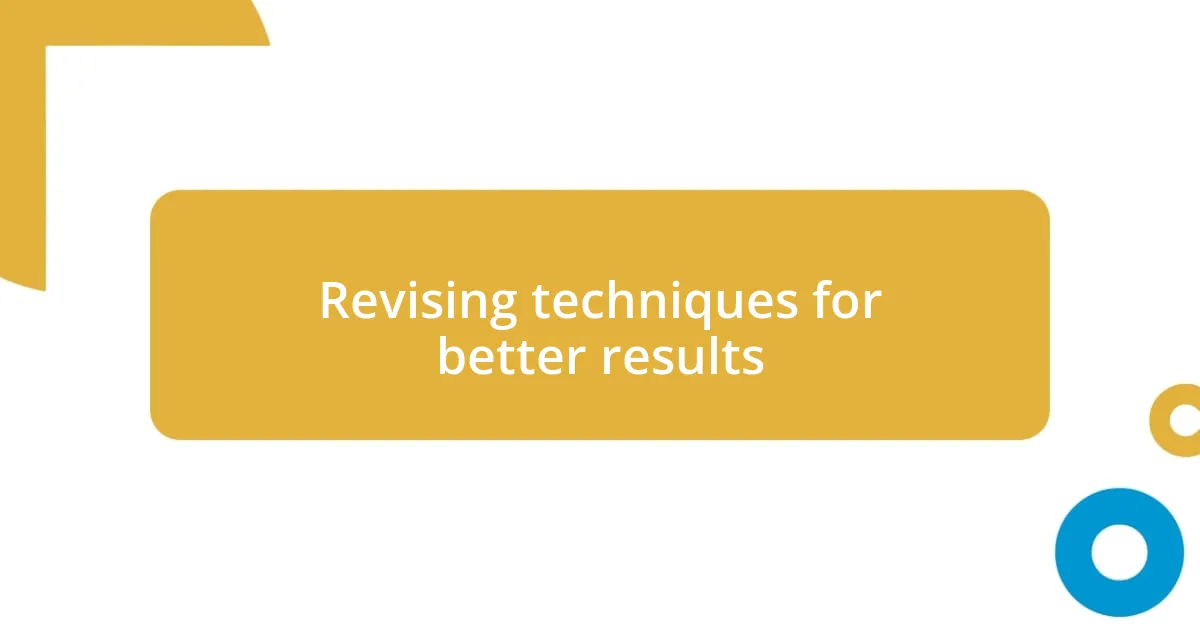
Revising techniques for better results
Revising poetry can feel like trying to untangle a complex emotional web, but I’ve found a few techniques that can genuinely uplift a poem. For instance, I often take a break after drafting a piece—just stepping away for a day or two can provide fresh eyes. Upon returning, I can see which lines resonate and which ones stumble. It’s remarkable how distance helps clarify what truly matters in a poem. Have you ever discovered new layers in your work after a simple pause?
In one of my earlier attempts, I was determined to include every intricate detail about my subject. It felt crucial at the time, but when I revisited the poem, I realized it was crowded and unfocused. So, I began the process of cutting away the excess, which surprisingly revealed a much stronger core. This taught me that sometimes, less really is more. When have you felt that stripping down your work led to greater clarity?
Another technique I swear by is reading my poem aloud. There’s something about hearing the rhythm and flow that illuminates awkward spots I couldn’t feel on the page. During a poetry workshop, I shared one piece that seemed solid in writing, but once I read it aloud, I noticed some lines stumbled. By adjusting the phrasing, the poem’s emotional impact improved dramatically. It’s fascinating how listening to our own words can guide us toward a better expression. Have you ever been struck by how a poem changes shape when spoken aloud?
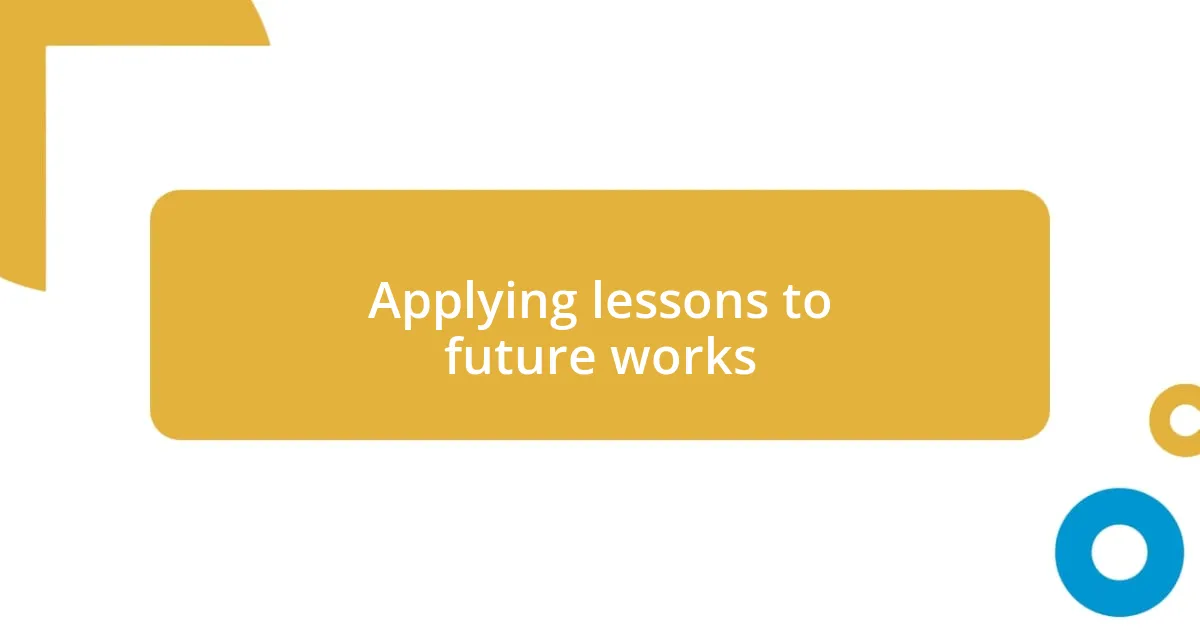
Applying lessons to future works
It’s funny how lessons from past mistakes can be like little guiding stars for my future poems. I vividly recall experimenting with a metaphor that fell flat, leaving me perplexed and frustrated. Instead of tossing it aside, I dug deeper into why it didn’t resonate. This journey taught me that metaphor shouldn’t just sound clever; it must serve the poem’s heart. I now approach metaphors with a focused intent, asking myself, “Does this truly add depth to my message?”
I also learned the importance of embracing feedback, even when it’s tough to hear. In a poetry group, someone pointed out that my imagery was all over the place; it felt like a gut punch. But instead of getting defensive, I decided to be curious. I examined how I could streamline my imagery to create a cohesive atmosphere. Now, I actively seek critiques and welcome diverse perspectives, realizing they often illuminate blind spots I hadn’t considered. Have you ever been surprised by the insights others can offer?
Another lesson I’ve firmly embraced is the value of vulnerability in my writing. There was a moment when I shared a deeply personal poem, fearing judgment. To my surprise, it sparked an open conversation among my peers about the very struggles I felt compelled to hide. This taught me that sharing my true self connects me to others in ways I never thought possible. I now make it a point to reflect on my emotions while writing, asking myself, “What am I really feeling, and how can I express that authentically?” Through this process, I’ve discovered that sharing my vulnerabilities not only enriches my work but also resonates powerfully with my readers.









